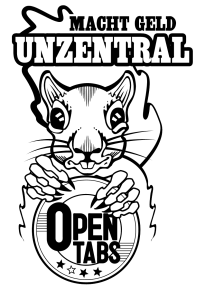
Opentabs is a peer-to-peer way to use money, bypassing the Plain Old Banking System (POBS) as a man-in-the-middle.
Whenever one of your friends owes you money, simply "tab it", so just write it down somewhere and accept that situation as a natural state of peace between two peers, instead of settling the debt. You can do this in several ways, for instance:
Banks had their function in a time when our societies were ruled by buildings full of paper. There was no way to administer trust other than through these paperwork machines. But in recent decades, the upcoming power of cryptography, mobile phones and internet connectivity have made it unnecessary to visit these paperwork buildings each time we want to use money. Through these new decentralized tools, it is now much simpler to simply "tab" the things we give each other.
Psychologically, Opentabs is a way to attribute recognition for the things we give each other. In most social relationships, it would be rude to accept a gift without saying thank you, and it would also be rude to spontaneously pay something for a stranger; it brings the relationship in an uneven state. As a form of "closure" of this uneven situation, simply writing the transaction down somewhere ("tabbing" it) can fulfill this necessary gift attribution, without the need to add a reverse transaction that cancels it out.
When we do want to settle a tab, then we can do this through the plain old banking system, but also through alternative money systems like Bitcoin, M-Pesa, paypal, Western Union, or one of the many grassroots "Bank Of Time" projects. These alternative platforms then simply take over the man-in-the-middle role from POBS, and money stored on them is not by definition safe, but the fact that we now have various equivalent options is already a step towards decentralization.
Taking the Opentabs approach one step further, a bar in a sports club could allow its members to deposit money behind the bar, and then withdraw from this as they go. Or equivalently, they could run a tab and settle it at the end of the month, together with their contribution bill.
Once a sports club uses open bar tabs in this way, maybe using some software tool, then members could also use their sports club as a mini-bank, making transactions from one person's open bar tab to the other whenever this is convenient.
If more and more people would do this, then all this would add more liquidity to the Opentabs system. In addition, people could help the system become more liquid by adding mutual debts with people they trust. If you agree to owe some money back and forth with a good friend or family member, then this becomes a series capacitor for the money circuit, which will allow alternating currents to flow through it, up to the maximum you set.
Paying a stranger is still hard. A stranger will often want to receive either cash or plastic money in exchange for something they give you. If more and more people use Opentabs systems and connect them up to each other, making it more connected and liquid, then some such transactions may be routable, but in general, you cannot rely on that yet. So then you will still need to use an actual transaction, and for that you will either need to load money onto your creditcard, or your bitcoin wallet, or get cash money out of an ATM using a POBS bank card, or load money into a SIM-card based money system like M-Pesa.
We have been trying out Opentabs with about twenty people throughout 2012. We still need to improve our tools quite a bit. In particular, we need ways to:
We will be working on these goals throughout 2013, so stay tuned. And whenever you have to split a bill with friends, remember: just tab it! :)
COMPLICITY | Michiel de Jong & Eleanor Saitta | #bgcon13 from Berliner Gazette on Vimeo.